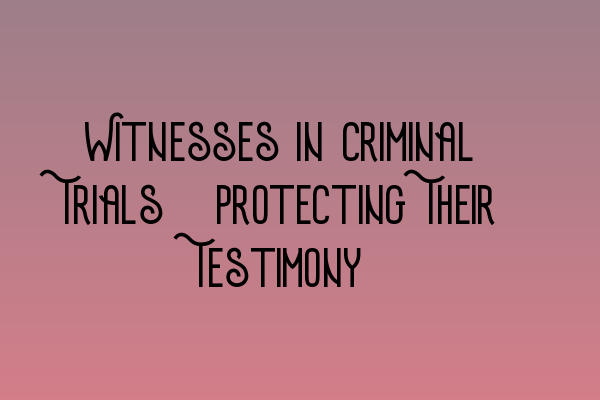Witnesses in Criminal Trials: Protecting Their Testimony
When it comes to criminal trials, witnesses play a crucial role in the pursuit of justice. Their testimonies can make or break a case, providing essential insights and evidence that can help determine the guilt or innocence of the accused. As legal professionals at SQE Criminal Law & Practice Law UK, we understand the importance of protecting the testimony of witnesses to ensure a fair and transparent trial process.
Protecting witnesses is not only about safeguarding their physical well-being but also their credibility and ability to provide accurate and reliable testimony. In this blog post, we will explore the various measures and considerations involved in protecting the testimony of witnesses in criminal trials.
The Role of Witnesses in Criminal Trials
Before we delve into the protection of witnesses’ testimonies, let us first understand their vital role in criminal trials. Witnesses are individuals who have firsthand knowledge or information relevant to a criminal case. They may have observed the crime being committed, possess information about the accused or victims, or have expertise that can shed light on specific aspects of the case.
Witnesses can provide critical evidence through their testimonies, which may include their observations, opinions, and expert analysis. Their accounts can corroborate or challenge other evidence presented in court, helping the judge and jury make informed decisions.
Challenges Faced by Witnesses
While witnesses are instrumental in the criminal justice system, they often face various challenges that can hinder their ability to testify effectively. These challenges include:
- Fear and Intimidation: Witnesses may fear retaliation from the accused, their associates, or even their own community. This fear can undermine their willingness to come forward and provide truthful testimony.
- Memory and Trauma: Witnesses may struggle to recall details accurately due to the traumatic nature of the events they witnessed. High-stress situations and the passage of time can impact their memory and make testifying challenging.
- Witness Tampering: Some witnesses may be coerced or threatened to alter their testimony or refrain from testifying altogether. This manipulation can seriously undermine the integrity of the trial process.
Protecting Witnesses
To ensure the protection of witnesses and the integrity of their testimonies, the legal system has implemented various measures. These measures include the following:
- Witness Protection Programs: Witness protection programs provide measures to relocate and safeguard witnesses who fear for their safety. These programs can offer new identities, physical protection, and legal support to witnesses and their families.
- Anonymity Orders: Anonymity orders can be issued by the court to protect the identity of witnesses. This prevents their personal information from being disclosed publicly, reducing the risk of harm or intimidation.
- Exclusion Orders: Exclusion orders can be utilized to clear the courtroom of spectators and potential intimidation sources during a witness’s testimony. This ensures a safe and comfortable environment for witnesses to give their evidence.
- Restriction on Cross-Examination: In certain cases, the court may limit the extent of cross-examination on sensitive or traumatic topics. This helps protect witnesses from undue pressure and emotional distress.
It is essential for legal professionals, including solicitors, barristers, and judges, to prioritize witness protection throughout the trial process. By creating a supportive and secure environment, witnesses are more likely to feel comfortable sharing their knowledge and experiences, thereby enhancing the pursuit of justice.
Conclusion
Witnesses are the backbone of criminal trials, providing invaluable testimonies that help determine the outcome of a case. Protecting witnesses is not only crucial for their safety but also for maintaining the integrity and fairness of the trial process.
At SQE Criminal Law & Practice Law UK, we recognize the significance of witness protection and the impact it has on the criminal justice system. By implementing measures such as witness protection programs, anonymity orders, exclusion orders, and limitations on cross-examination, we aim to ensure witnesses can testify without fear or intimidation.
If you are interested in learning more about criminal practice, witness protection, and other related topics, we invite you to explore the following articles:
- Workshops and Seminars on Criminal Practice: Expanding Your Expertise
- Updates in UK Criminal Laws: Staying Informed and Prepared
- Mock Tests for SQE Criminal Practice: Exam Simulation for Success
- Enhancing Your SQE Criminal Law Study Group Experience
- Decoding Criminal Evidence Rules: A Detailed Analysis
Protecting witnesses is not only a legal obligation but a moral imperative. By prioritizing witness protection, we can ensure that the voices of those who have witnessed crimes are heard and justice is served.
